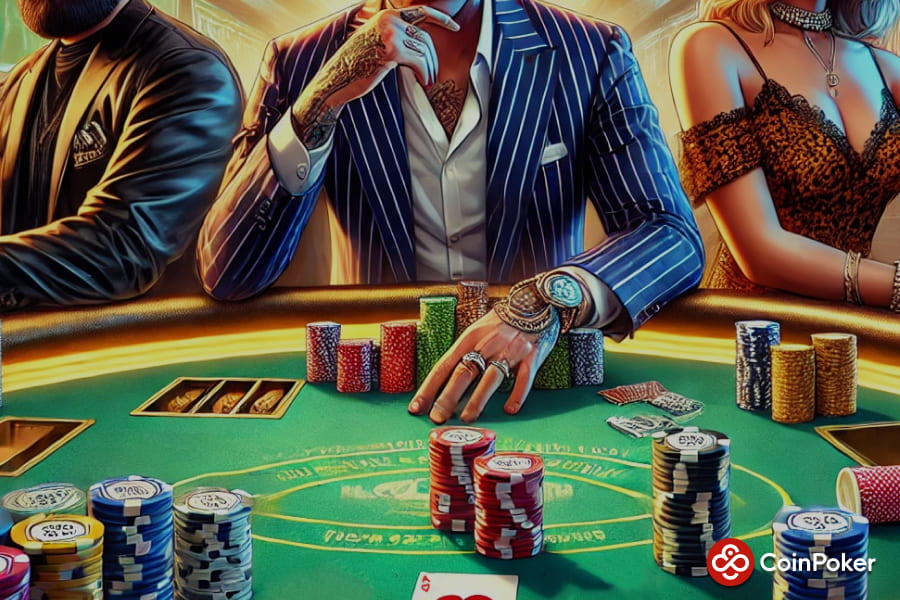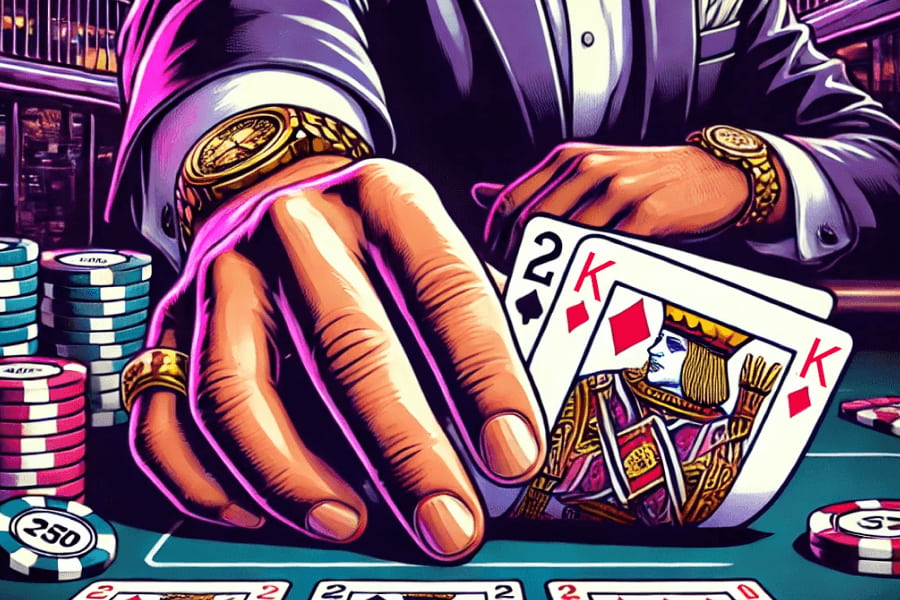Last Updated: 12 September 2025
Is Poker a Sport? A Complete Analysis to End the Debate
If you've ever wondered, "Is poker a sport or game?" - it's time you got the answers. Discover poker's classification and why it is or isn't a sport.
CultureEver watched a chess grandmaster calculate moves and thought “That’s an athlete at work”? At CoinPoker, we’ve watched players grow from casual games to high-stakes competition. The mental demands rival any athletic sport – whether you’re grinding through multi-day tournaments or battling in high-roller events, poker pros need the focus and discipline of elite athletes.
But here’s the million-dollar question that keeps popping up: is poker really a sport? Let’s dive into this debate and break down what makes poker both similar to and different from traditional sports.
Is Poker a Sport or Game? Breaking Down the Basics
Here’s the thing about categorizing poker – it’s not as straightforward as knowing whether you’ve got the best hand. While most casino games pit you against the house, poker throws you into a mental battlefield against other players, each armed with their own strategies, tells, and psychological warfare tactics.
The modern poker landscape has evolved far beyond your Friday night home game. When you’ve got players hiring nutritionists and personal trainers to handle 12-hour tournament days, or spending more time studying strategy than most college students spend on finals, you start to see why this debate gets interesting.

What Makes Something a Sport?
A sport, as defined by the Oxford English Dictionary, is “an activity involving physical exertion and skill in which an individual or team competes against another or others for entertainment.” Merriam-Webster adds that it’s “a physical activity engaged in for pleasure.”
A game is a structured activity with rules, goals, and competition. But what makes something truly qualify as a game? Let’s look at the basic building blocks:
Physical Elements:
- How much physical effort does it take?
- How long can players keep going?
- Does it need coordination or physical skill?
- How does it affect players’ energy and stamina?
Competition Basics:
- How do you know who wins?
- Is there a standard way to compete?
- Are the rules clear and consistent?
- Can you measure who’s better?
Skills Needed:
- Is it easy to learn but hard to master?
- Does strategy matter?
- How much thinking and decision-making is involved?
- What helps players perform better?
Looking at poker through this lens gets interesting. Some things clearly make it a game – like its clear rules and winning conditions. Other aspects are more debatable, like how much physical stamina matters or whether skill beats luck. It raises some fascinating questions about what type of game poker really is.
What Defines a Game? The Other Side of the Coin
A game, according to the Oxford English Dictionary, is “a form of competitive activity or sport played according to rules.” Cambridge Dictionary adds that it’s “an activity or sport with rules in which people or teams compete against each other.”
This definition immediately presents an interesting question for poker – while it clearly meets the criteria of rules and competition, the line between game and sport remains debatable. The mention of “competitive activity or sport” in the definition itself suggests these categories aren’t always clearly separated.
Are Similar Games Considered Sports?
Check this out – several “mind sports” have already made the leap:
Chess has gained significant recognition from the International Olympic Committee, with research showing players can burn thousands of calories during intense matches. Like traditional athletes, top chess players require serious physical stamina and follow rigorous training regimens.
Bridge has also earned IOC recognition for its demanding nature. Its team-based competition structure and complex strategic elements have led to prestigious international championships that mirror traditional sporting events.
Esports have exploded into mainstream acceptance, featuring major tournaments with prize pools that rival traditional sports. The physical demands are real – many players must maintain over 300 actions per minute during competition. Professional teams now operate from dedicated training facilities, treating their players like traditional athletes.
Reasons Why Poker Is a Sport
To many people in the poker world, calling poker a sport isn’t even a debate anymore. With major networks broadcasting tournaments, the most famous players maintaining strict training regimens, and competitions that demand both mental and physical endurance, poker has evolved far beyond its card game origins. A growing number of players, coaches, and industry professionals view poker as a competitive sport that belongs alongside other mind-sport competitions.
Let’s break down why poker might deserve that “sport” label.
The Skill Factor is Real
Think poker’s just about the cards you’re dealt? Try telling that to the pros who:
- Calculate mathematical numbers faster than most people do their taxes
- Read body language like a detective scanning a crime scene
- Manage bankrolls like Wall Street traders (but with better hours)
- Make split-second decisions with six-figure consequences
- Study the game more thoroughly than med students prep for finals
The Competition is Next Level
Modern poker tournaments would make most traditional sports events look small:
- Multi-day events that test physical and mental endurance
- Fields larger than the Boston Marathon
- Prize pools that rival major golf tournaments – like the WSOP Main Event’s $10 million first-place prize compared to The Masters’ $3.6 million winner’s check.
- Global rankings and point systems
- International broadcasts and media coverage
- Professional teams and sponsorships
Physical Demands? You Better Believe It
Card games aren’t just sitting around and occasionally moving chips – there’s definitely a physical element to poker:
- 12-14 hour days at the table
- Multi-day tournaments with minimal rest
- Constant focus and concentration
- Jet lag from following international poker tournaments
- Heart-pounding pressure situations
- Maintaining composure under stress
- Managing sleep and diet during events
Top players treat their bodies like temples because they know physical condition affects mental performance.
Arguments Against Poker as a Sport
Not everyone buys into poker being a sport. In fact, plenty of people think that’s ridiculous. Sure, poker has come a long way – we’ve got pro players, huge tournaments, and ESPN coverage. But for many folks, that’s not enough.
The skeptics have a simple view: if it involves cards and chips, it’s a game, not a sport. Period.
Let’s be fair and look at the other side of this debate. Why do some people firmly believe poker isn’t a sport? Here are their main arguments.

The Relationship Between Poker and Luck
In any discussion about poker as a sport, we have to talk about luck. It’s the most obvious difference between poker and traditional sports – you can’t practice your way into better cards, and even the worst player at the table can win a hand against Phil Ivey. This element of chance is both poker’s most controversial aspect and, paradoxically, what makes the game so compelling.
Yeah, we need to address the elephant in the room:
- Short-term results can be random and surprising
- Perfect play doesn’t guarantee winning
- Bad beats and unlucky situations happen to everyone
- You can’t control the cards
- Variance is a real thing, meaning results outside the normal expectation
- Sometimes beginners get lucky against experienced players
Just like a pro golfer can’t control the wind, a poker player can’t control the cards. But here’s what fascinates us at CoinPoker: over a large enough sample size, skill consistently rises to the top. The math doesn’t lie: the same faces keep appearing at final tables, and that’s no coincidence.
The “Athleticism” Debate
For many people, what makes a sport a sport is movement or physicality. So, let’s be honest about what poker players aren’t doing:
- No running (unless it’s during a victory lap)
- No jumping (except for joy after winning)
- No traditional athletic movements
- No obvious physical prowess is required
- No cardio requirements
- No strength training is needed
But then again, Olympic shooting athletes aren’t exactly doing burpees between rounds.
Will This Debate Ever End?
Look, poker might never fit neatly into either the “sport” or “game” box – and maybe that’s okay. The reality is that modern poker has evolved into something that defies traditional classification. It combines elements of both sports and games in a unique way that few other competitive activities do.
What matters is that poker has developed all the hallmarks of a legitimate sport: fierce competition at the highest levels, a massive skill gap between amateurs and professionals, unique physical and mental challenges, compelling entertainment value, established professional infrastructure, and rewards that match the incredible dedication required to succeed.
Whether you call it a sport, a game, or something in between, one thing is clear – poker has earned its place alongside other serious competitive pursuits. The debate might continue, but poker’s legitimacy as a challenging, skill-based competition is beyond question.
Ready to test your own skills and see what the fuss is about? Join us at CoinPoker and discover firsthand why this debate even exists. Whether you consider it a sport, a game, or something in between, one thing’s for sure – poker’s competitive spirit is undeniable.
FAQs
While debate continues, poker combines elements of both sports and strategy games, with professional circuits and skill requirements similar to recognized sports.
It’s both and neither – poker contains gambling elements but requires skill levels that separate it from pure chance-based games.
It’s best described as a mind sport, combining elements of both traditional sports and strategic games.
Critics point to the luck element and lack of traditional athletic activity, though many recognized sports share similar characteristics.
Through its competitive structure, skill requirements, professional organization, physical demands, and mental challenges – much like traditional sports.
Explore More
Announcements
Read recent announcements from CoinPoker about new games, ambassadors, and changes to our platform.
8 PostsGuides
The go-to resource for mastering poker with expert tips and strategies. Our guides will elevate your poker skill level.
60 PostsNews
Find the latest poker news and latest CoinPoker Newsletters. Get updates about games, promotions, and crypto news.
92 PostsPromotions
Find the latest coinpoker promotions here. Explore the crypto poker world with the best poker promotions available.
1 Post
















